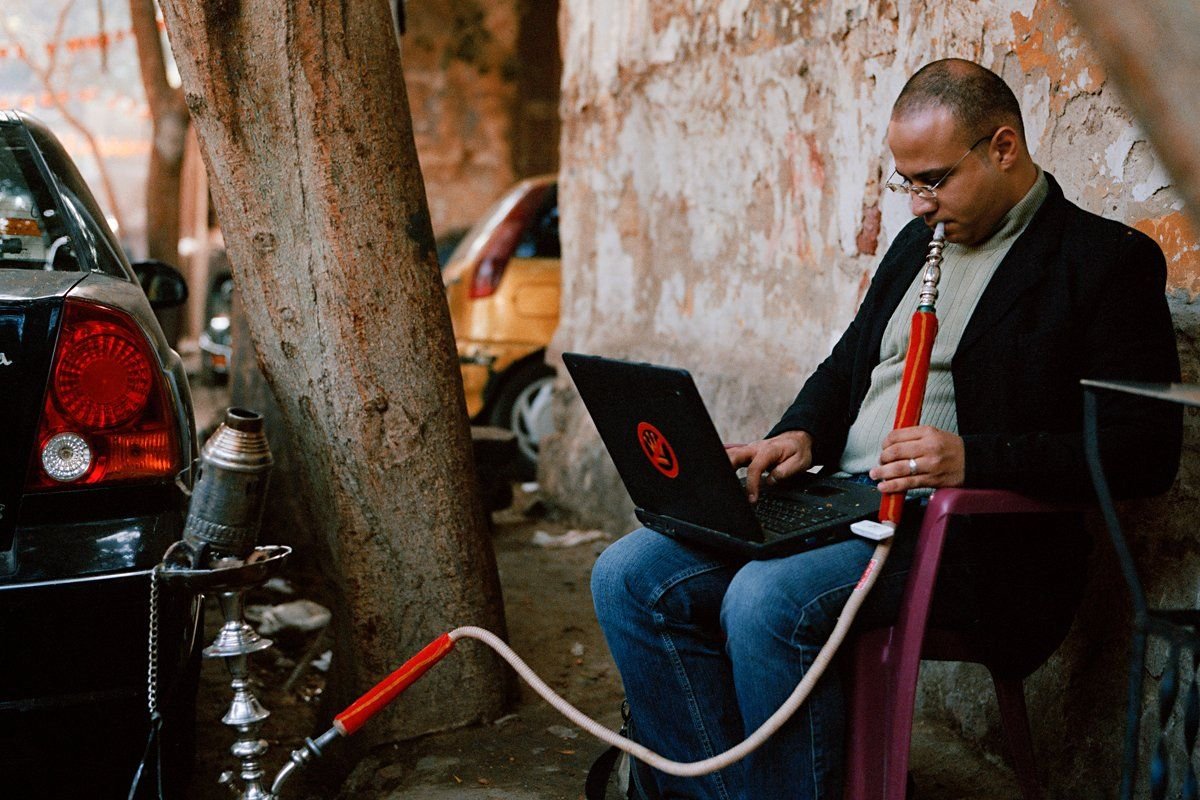
Hours after the government in Egypt shut down that country's access to the Internet, hackers around the world started banding together to craft some kind of work-around. And one group claims to be only a day or two away from delivering a partial solution.
Their initiative is called the Open Mesh Project, and it began when Shervin Pishevar, an Internet entrepreneur in Palo Alto, Calif., posted a message on Twitter calling for help shipping software into Egypt that could turn regular laptops into low-cost Internet routers, forming what's known as a "mesh network," where each computer can route messages along to the others.

Since then, engineers from around the world have been spreading the word and kicking in to help. The mesh network would at least let people communicate with others located close to them. The laptops can all talk to each other. If one goes out, messages just find another way to zip through the cluster of machines.
"This would at least let people build an ad hoc mobile network," Pishevar said. "At the very least, people inside Egypt will be able to communicate with each other and organize."
Also, if someone in the mesh network manages to obtain a connection to the outside world, that person can share his or her connection with others on the network.
In a similar team effort, engineers from Google and Twitter have figured out a way to let people in Egypt send tweets over any phone, either landline or mobile. The technology converts spoken words in a voice-mail message into text messages that can be sent over Twitter.
There are still a few ways to get onto the Internet in Egypt, even though as of Monday the government announced it had shut down Noor, the one ISP that had continued to operate even after last Thursday's shutdown.
Some people are using landline connections and dial-up modems to call ISPs in other countries and get onto the Internet. Still others are using satellite connections.
Pishevar posted his call to arms on Twitter soon after the Egyptian government shut down the Internet last Thursday, Jan. 27. One of the first to respond was Gary Jay Brooks, who runs a tech company in Traverse City, Mich.
Brooks put up a website and started fielding messages from engineers around the world. He says he also been in touch with wireless engineers inside Egypt who could help distribute and install mesh- networking software.
A team of engineers in the United States has "pieces and parts" of software that could be put together to create a mesh-networking program that would be easy for regular people to install and use, says Brooks. "In less than 48 hours, we can put a program together and distribute it via CDs or USB thumb drives," he says.
Mesh networking is an old idea. Oddly enough, the low-cost XO Laptop built by the One Laptop Per Child organization—the so-called $100 laptop—was designed with built-in mesh networking. The idea with the XO machine was that many kids using those laptops would be out in rural areas without reliable Internet access. But they could at least connect with each other. And, if at least one person in a village had an Internet connection, everyone could share it.
OLPC has shipped XO machines to Egypt, but a spokeswoman for the group said there is no program taking place now to use those machines to connect people during the Internet blackout.
But there other ways to make a mesh network without building it into laptops. Pishevar received an email from a team of engineers in Canada who have designed a miniature networking router, about the size of a brick, that contains mesh-networking software. "They heard about what we were doing and reached out to us—it's exactly what I was envisioning," Pishevar says.
The product they've been working on is a mobile router, small enough to fit into a backpack. "You could have a number of these routers in backpacks or in cars moving around the city or mounted on rooftops—and with these you could create a kind of secondary Internet, one that would not be blockable," he says.
Pishevar said he needs about $1 million in funding to start manufacturing the routers, and could have them ready to go in three or four months. He says he's already received a funding commitment from a venture capitalist, though he did not want to identify the investor. "It's all moving so fast. It's like a startup. It's all organized via Twitter, and it's all volunteers," he says.
Presumably Egypt will have reopened Internet access before these little routers are ready to go. But Pishevar hopes to build them anyway and distribute them in countries with repressive governments—he mentioned Iran, Syria, and Yemen—to prevent something like the current situation in Egypt from happening somewhere else.
Pishevar, 36, was born in Iran and escaped with his family 30 years ago in the wake of the Iranian revolution. He attended the University of California, Berkeley, and became an Internet entrepreneur. He has started several companies and now runs a Web videogame company called Social Gaming Network.
Pishevar says his childhood experience in Iran is what got him motivated to do something about the situation in Egypt. "I'm an American," he says. "I'm a child of war. I remember Saddam dropping bombs in the Iran-Iraq War. Others have been through much worse than I have, but that defined my ideas around freedom."
He wants to ship mesh-networking technology into "any country where there is dictatorship," he says. "My dream is that in my lifetime we can get rid of dictatorships—I want to eradicate dictators from our planet."
The good news is that thousands of geeks and hackers and engineers from around the planet apparently agree with him.
This article originally appeared on The Daily Beast.
Uncommon Knowledge
Newsweek is committed to challenging conventional wisdom and finding connections in the search for common ground.
Newsweek is committed to challenging conventional wisdom and finding connections in the search for common ground.
About the writer
To read how Newsweek uses AI as a newsroom tool, Click here.








